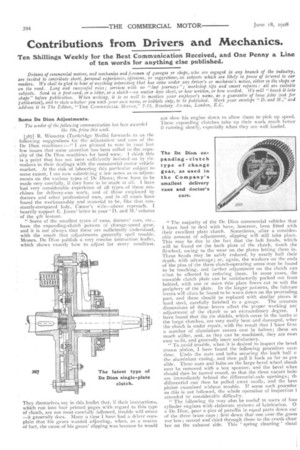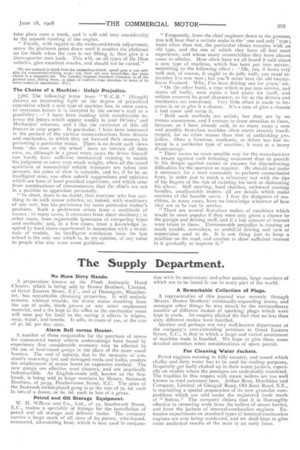Contributions from Drivers and Mechanics.
Page 20

Page 21

If you've noticed an error in this article please click here to report it so we can fix it.
Ten Shillings Weekly for the Best Communication Received, and One Penny a Line of ten words for anything else published.
Drivers of commercial motors, and mechanics and fcremen of garages or shops, who are engaged in any branch of the industry, are invited to contribute short, personal experiences, opinions, or suggestions, on subjects which are likely to prove of in'erest to our readers. We shall be glad to hear of anything interesting that has come under any driver's or mechanic's notice, either in the shops or on the road. Long and successful runs ; services with no "lost journeys" ; workshop tips and smart repairs : all are suitable subjects. Send us a post-card, or a letter, or a sketch—no matter how short, or how written, or how worded. We will "knock it into shape" before publication. When writing, it is as well to mention your employer's name, as a guarantee of bona fides (not for publication), and to stote whether you wish your own name, or initials only, to be published. Mark your envelope " D. and M.," ar.d address it to The Editor, " THE COMMERCIAL MocoR.," 7-15, Rosebery Annue, London, E.C.
Some De Dion Adjustments.
The sender of the following communication has been awardel the 10s. prize this week.
L3871 R. WEnsTER (Tunbridge Wells) forwards to us the following suggestions for the adjustment and care of the De Dion machines :—" I am pleased to note in your last few issues that some attention has been called to the capacity of the De Dion machines for hard wear. I think this is a point that has not been sufficiently insisted on by the makers in their dealings with the commercial motor vehicle • market. At the risk of labouring this particular subject to some extent, I am now submitting a few notes as to adjustments on the various types of De Dims; these have to be made very carefully, if they have to be made at all. I have had very considerable experience of all types of these machines for delivery-van work, and of those employed by doctors and other professional men, and in all cases have found the workmanship and material to be, like that constantly-compared lady, (_7sar's Wife—above reproach. I
• heartily support E. Jones' letter in your D. and M.' column of the 4th instant.
" Some of the smallest types of vans, doctors' cars, etc., have the expanding-clutch pattern of change-speed gear, and it is not always that these are sufficiently understood, with the result that adjustments generally spell trouble. Messrs. De Dion publish a very concise instruction leaflet, which shows exactly how to adjust for every condition.
They themselves say in this leaflet that, if their instructions, which run into four printed pages with regard to this type of clutch, are not most carefully followed, trouble will ensue —it generally does. Many a time I have had a driver complain that his gears wanted adjusting, when, as a matter of fact, the cause of his gears' slipping was because he would not slow his engine down to allow them to pick up speed. These expanding clutches take up their work much better if running slowly, especially when they are well loaded, "The majority of the De Dion commercial vehicles that
• I have had to deal with have, however, been fitted with their excellent plate clutch. Sometimes, after a considerable amount of adjustment, slipping will still take place. This may be due to the fact that the bolt heads, which will be found on the back plate of the clutch, touch the flywheel, owing to the wear on the plates letting them in. These heads may be safely reduced, by nearly half their depth, with advantage; or, again, the washers on the ends of the pins of the three' clutch-operating arms"may be found to be touching, and further adjustment on the clutch can often be effected by reducing them. In some cases, the movable clutch plate can be satisfactorily packed out from behind, with one or more thin plate liners cut to suit the periphery of the plate. In the larger patterns, the fulcrum levers will often be found to be worn down on the protruding part, and these should be replaced with similar pieces in
hard steel, carefully finished to a gauge. The accurate dimensions of these levers affect the proper working ane adjustment of the clutch to an extraordinary degree. I have found that the tin shields, which cover in the backs ol the large clutches, are very easily bent and damaged, wher the clutch is under repair, with the result that I have fitter a number of aluminium covers cast in halves; these an much stiffer, and, as they can be machined, they are mon easy to fit, and generally more satisfactory.
" To avoid trouble, when it is desired to inspect the bevel. crown pinion, I have found the following procedure save! time. Undo the nuts and bolts securing the back half a the aluminium casing, and then pull it -back as far as pos sible. Three nuts and bolts on the large bevel wheel shot& next be removed with a box spanner, and the bevel whee should then be turned round, so that the three vacant holem are immediately behind the differential-axle openings; tit, differential can then be pulled away easily, and the bev€ pinion examined without trouble. If some such procedur as this is not followed, the whole operation of inspettion attended by considerable difficulty. " The following tip may also be useful to users of four -cylinder engines with elaborate systems of lubrication. 0: a De Dion, pour a pint of paraffin in equal parts down ear: of the three brass caps : first down that one over the govet nor box; second and third through those to the crank chaff her on the exhaust side, This ' spring cleaning ' shoul
take place once a week, and it will add very considerably to the smooth running of the engine. " Finally, with regard to the make-and-break adjustment, screw the platinum point down until it touches the platinum on the blade when the cam is not lifting it, then give it a three-quarter turn back. This will, on all types of De Dion vehicles, give excellent results, and should not be varied."
[We are inclined to think that the expanding-clutch, speed gear is not suitable for commercial-vehicle work ; but, from our own knowledge, the plate luta is a beautiful job. The London General Omnibus Company is, at the present time, fitting them, in place of leather, cone clutches, on some of its other makes of omnibuses—Ito.]
The Choice of a Machine ; Unfair Prejudice.
[3861 The following letter from " W.C.B. " (Slough) throws an interesting light on the degree of prejudiced opposition which a new type of machine has, in some cases, to overcome before it is accepted by the owner's staff as a possibility :—" I have been reading with considerable interest the letters which appear weekly in your Drivers' and Mechanics' columns, and I like the extension of this old feature in your paper. In particular, I have been interested in the perusal of the various communications from drivers and mechanics, in which they set forward their reasons for preferring a particular make. There is no doubt such views from the man at the wheel ' have an interest all their own, as, although in a great many cases the driver himself earl hardly have sufficient mechanical training to enable his judgment to carry very much weight, when all the vexed questions of commercial vehicle transport are taken into account, his point of view is valuable, and he, if he be an intelligent man, can often submit suggestions and opinions which are born of hard practical experience, and which arise from combinations of circumstances that the Chiefs are not in a position to appreciate personally.
" In short, there is no doubt, that everyone who has anything to do with motor vehicles, or, indeed,-with machinery of any sort, has his preference for some particular maker's products. Such a preference arises from a multitude of causes : in many cases, it emanates from sheer obstinacy ; in other cases, from regrettable ignorance of competing types and methods; and, in a few cases, froth a knowledge inspired by hard times experienced in connection with a multitude of models. An intelligent conclusion from the last school is the only one which is, in my opinion, of any value to people who may want some guidance.
" Frequently, from the chief engineer down to the greaser, you will hear that a certain make is the' one and only 'type; more often than not, the particular choice remains with an old type, and the one of which they have all had most experience, and whose many eccentricities they have almost come to admire. How often have we all heard it said about a new type of machine, which has been put into service, something to the following effect Oh, yes, it looks very well and, of course, it ought to do jolly well; you must remember it's new now; but you'll never beat the old twentyhorse Pushard. Whv, I've been driving one for years,' etc.
" On the other hand, a type which is put into service, and starts off badly, soon earns a bad name for itself, and seldom recovers its good character, so far as the drivers and mechanics are concerned. Very little effort is made to improve it, or to give it a chance. It's a case of give a chassis a bad name and scrap it.
" Both such methods are unfair, but they are by no means uncommon, and I venture to draw attention to them, because,. as I have already said, in so many cases a new and possibly first-class machine of ten starts severely handicapped, for no other reason than that of unthinking le-cjudice. Once a foreman, mechanic, or driver has lost interest in a particular type of machine, it runs at a heavy disadvantage.
" There seems no more sensible way for the manufacturer to insure against such irritating treatment than to provide in his design against causes or excuses for discomforting difficulties for the operator or repairer. He should not make it necessary for a man constantly to perform contortionist feats, in order just to reach a refractory. nut with the tips of his fingers at the risk of twistinghis neck or dislocating his elbow. Stiff steering, hard clutches, awkward starting handles, unadjustable brakes—all are details which make enemies of the humble users-. I fear the designers of machines, in many cases, have no knowledge whatever of how they are to be run in service.
There are several first-class makes of machines which would be more popular if they were only given a chance by the garage and driving staff, and if a fair amount of interest were taken in them. Unreasonable prejudice is causing as much trouble, nowadays, as unskilful driving and ia(AK of supervision used to do. It is one thing just to keep a machine on the road, and another to show sufficient interest in it gradually to improve it."






















